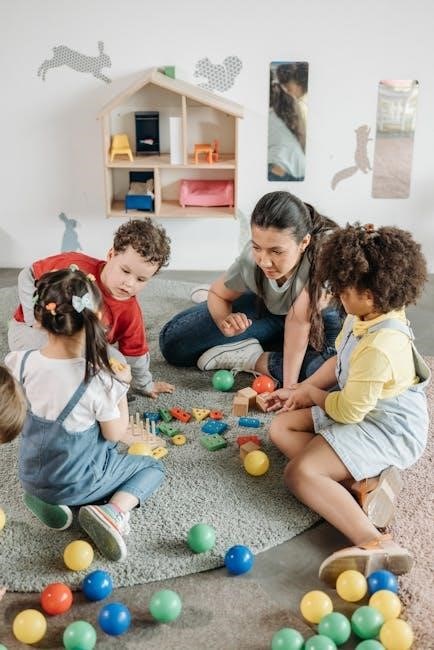French word classes are essential for understanding grammar. PDF exercises offer various activities like identifying word classes, creating nominal groups, and solving crosswords. They help improve language skills and vocabulary effectively.

Importance of Understanding Word Classes
Understanding French word classes is crucial for mastering sentence structure and effective communication. It helps learners identify roles of words like nouns, verbs, and adjectives, ensuring proper sentence formation. Accurate word classification enhances vocabulary usage, improves text comprehension, and aids in distinguishing similar word classes. PDF exercises provide structured practice, reinforcing grammar rules and language proficiency through activities like identifying classes, creating nominal groups, and solving crosswords. These resources offer a comprehensive approach to learning, catering to various skill levels and learning styles. By practicing with exercises, learners can analyze and correct errors, improving their linguistic skills progressively. Thus, grasping word classes is foundational for both written and spoken French, enabling clear and precise expression.
Identifying Word Classes in Sentences
Identifying word classes involves analyzing sentence structure to recognize nouns, verbs, adjectives, and determinants. PDF exercises provide practical tasks to locate and categorize words within sentences accurately.
Exercises on Linking Words to Their Classes
Exercises on linking words to their classes are designed to enhance grammar understanding. PDF resources provide various activities, such as matching words to their classes, creating sentences, and solving crosswords. These exercises help learners identify nouns, verbs, adjectives, and determinants within sentences. By practicing these tasks, students improve their ability to recognize and categorize words accurately. Clear instructions and examples are often included to guide learners. Such exercises also cover forming nominal groups and using determinants effectively. They are ideal for reinforcing grammar rules and expanding vocabulary. Regular practice with these exercises ensures a strong foundation in French grammar. PDF worksheets offer a convenient way to engage with these activities anytime, making learning interactive and enjoyable.
Forming Nominal Groups with Determinants
Determinants like “le,” “la,” “les,” “un,” and “une” precede nouns, forming nominal groups. For example, “le livre” or “une maison” demonstrates their role in French grammar.
Using Determinants and Adjectives
Determinants and adjectives are crucial in forming nominal groups. Determinants like “le,” “la,” and “les” specify nouns, while adjectives describe them. For example, “le grand livre” combines a determinant (“le”) and an adjective (“grand”) with a noun (“livre”).
Exercises often involve identifying and using these word classes. Students match determinants and adjectives to nouns, creating phrases like “une maison bleue” or “des enfants heureux.” Such activities enhance understanding of French grammar and vocabulary.
Practicing with PDF worksheets helps learners master the correct use of determinants and adjectives, ensuring clear and precise communication in French sentences. These exercises are essential for building strong foundational skills in French grammar.
Creating Sentences with Given Words

Exercises involve forming sentences using specific words. For example, “Le garçon lit un livre” uses determinants and nouns. Such activities improve grammar and vocabulary skills effectively.
Examples and Templates

Templates provide structured frameworks for sentence creation. For example:
- Template 1: Le [déterminant] [nom] [verbe] [préposition] [nom].
Example: Le garçon lit un livre. - Template 2: [Pronom] [verbe] [adjectif] [nom].
Example: Elle mange une pomme rouge.
Such templates guide learners in applying grammar rules. They also help in understanding sentence structure and word placement. Regular practice with these examples enhances vocabulary and sentence formation skills.
Templates encourage creativity while ensuring grammatical accuracy. They are ideal for beginners and intermediate learners alike, offering a clear path to mastering French sentence composition.
Word Class Crosswords and Puzzles
Interactive crosswords and puzzles are engaging tools for learning word classes. They challenge learners to classify words correctly, reinforcing grammar and vocabulary in a fun, problem-solving format.
How to Create and Solve Them
Creating word class crosswords involves designing a grid with themed word lists, ensuring each clue relates to a specific class, like nouns or adjectives. Start by planning the theme and grid size, then fill in words strategically. For solving, begin with familiar words and use word class knowledge to deduce missing terms. Crosswords enhance vocabulary and grammar skills in an engaging way. Additional puzzles, like word searches, can reinforce learning. PDF resources often include step-by-step guides and templates for both creation and solving, making them accessible for all skill levels. These activities are ideal for interactive and fun language practice, helping learners master French word classes effectively.

Distinguishing Between Similar Word Classes
Distinguishing between similar French word classes, such as nouns and verbs, requires careful analysis of their grammatical roles. For instance, le chien (the dog) is a noun, while chienner (to dog) is a verb. Exercises in PDF resources often focus on identifying these differences through sentence context. Activities include matching words to their classes and filling in the correct form in sentences. For example, determining whether a word functions as an adjective or an adverb in a given phrase. Additionally, worksheets provide tips for recognizing patterns, such as noun endings (-eur, -age) and verb conjugations. These exercises help learners avoid common mistakes and build a stronger grasp of French grammar. Regular practice with these resources ensures mastery of word class distinctions, enhancing overall language proficiency.

Error Analysis and Correction

Error analysis is crucial for improving French grammar skills, especially when identifying word classes. Common mistakes include confusing nouns and verbs, such as le chien (noun) vs. chienner (verb). PDF exercises often highlight these errors, providing corrective feedback. For example, learners may misclassify adjectives as adverbs or vice versa. Activities in worksheets guide users to re-examine sentences and correct their mistakes. One exercise involves identifying incorrect word classifications in phrases, such as Il marche rapidement, where rapidement is an adverb, not an adjective. Correction tips are provided to clarify distinctions, like adding -ment for adverbs. Regular practice with these resources helps learners avoid recurring errors and refine their understanding of word classes. This iterative process enhances accuracy and confidence in French grammar.

Interactive and Fun Activities
Interactive activities make learning French word classes engaging and enjoyable. PDF resources often include crossword puzzles, word searches, and matching games that challenge learners to identify and classify words. For example, exercises like Relie chaque mot à sa classe grammaticale encourage learners to link words to their correct categories. Group activities, such as creating sentences with given words, foster collaboration and creativity. Games like mots-croisés (crosswords) test knowledge of word classes in a fun way. These activities not only reinforce grammar rules but also make practice dynamic and motivating. They are particularly effective for visual and kinesthetic learners, helping them retain information better. Regular participation in such exercises enhances fluency and accuracy in using French word classes correctly.

PDF Resources and Worksheets
PDF resources and worksheets are invaluable tools for practicing French word classes. They provide structured exercises, such as identifying word classes, creating nominal groups, and solving crosswords. Many PDFs include activities like Relie chaque mot à sa classe grammaticale, where learners match words to their grammatical categories. Worksheets often feature exercises on determinants, adjectives, and verbs, with clear instructions and answers for self-correction. For example, one exercise might ask learners to underline nouns in sentences or classify words into categories like noms, verbes, and adjectifs. These resources are ideal for independent study and classroom use, offering a variety of engaging and educational activities to master French grammar effectively.
Mastering French word classes is a cornerstone of language proficiency. Regular practice with exercises like identifying word classes, forming nominal groups, and solving crosswords reinforces grammar skills. For further practice, learners can explore additional PDF resources, online quizzes, or language learning apps. Engaging in activities such as creating sentences with specific word groups or translating texts enhances understanding. Consistent practice ensures learners become adept at distinguishing between similar word classes and correcting common errors. By combining theoretical knowledge with practical exercises, learners can confidently navigate French grammar and improve their communication skills. Encourage continuous learning through diverse and enjoyable activities to solidify grasp of word classes and their usage in everyday language.
